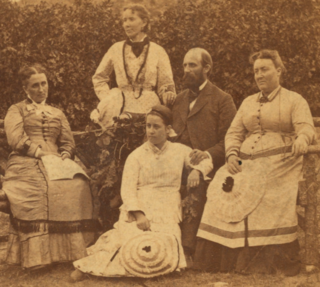Related Research Articles
Polygamy is the practice of marrying multiple spouses. When a man is married to more than one wife at the same time, it is called polygyny. When a woman is married to more than one husband at the same time, it is called polyandry. In sociobiology and zoology, researchers use polygamy in a broad sense to mean any form of multiple mating.

Polygamy was practiced by leaders of the Church of Jesus Christ of Latter-day Saints for more than half of the 19th century, and practiced publicly from 1852 to 1890 by between 20 and 30 percent of Latter-day Saint families.

In a culture where only monogamous relationships are legally recognized, bigamy is the act of entering into a marriage with one person while still legally married to another. A legal or de facto separation of the couple does not alter their marital status as married persons. In the case of a person in the process of divorcing their spouse, that person is taken to be legally married until such time as the divorce becomes final or absolute under the law of the relevant jurisdiction. Bigamy laws do not apply to couples in a de facto or cohabitation relationship, or that enter such relationships when one is legally married. If the prior marriage is for any reason void, the couple is not married, and hence each party is free to marry another without falling foul of the bigamy laws.

Mormon fundamentalism is a belief in the validity of selected fundamental aspects of Mormonism as taught and practiced in the nineteenth century, particularly during the administrations of Joseph Smith, Brigham Young, and John Taylor, the first three presidents of the Church of Jesus Christ of Latter-day Saints. Mormon fundamentalists seek to uphold tenets and practices no longer held by mainstream Mormons. The principle most often associated with Mormon fundamentalism is plural marriage, a form of polygyny first taught in the Latter Day Saint movement by the movement's founder, Smith. A second and closely associated principle is that of the United Order, a form of egalitarian communalism. Mormon fundamentalists believe that these and other principles were wrongly abandoned or changed by the LDS Church in its efforts to become reconciled with mainstream American society. Today, the LDS Church excommunicates any of its members who practice plural marriage or who otherwise closely associate themselves with Mormon fundamentalist practices.
Conflict of marriage laws is the conflict of laws with respect to marriage in different jurisdictions. When marriage-related issues arise between couples with diverse backgrounds, questions as to which legal systems and norms should be applied to the relationship naturally follow with various potentially applicable systems frequently conflicting with one another.
Polygamy is the practice of having more than one spouse at the same time. Specifically, polygyny is the practice of one man taking more than one wife while polyandry is the practice of one woman taking more than one husband. Polygamy is a common marriage pattern in some parts of the world. In North America, polygamy has not been a culturally normative or legally recognized institution since the continent's colonization by Europeans.

Polygamy, including polygyny, is outlawed in India. While it was not prohibited in Ancient India and was common among aristocrats and emperors, it is believed that it was not a major cultural practice. The lack of prohibition was in part due to the separation between land laws and religion, and partially since all of the major religions of India portrayed polygamy in a neutral light.

Under civil law, Nigeria does not recognize polygamous unions. However, 12 out of the 36 Nigerian states recognize polygamous marriages as being equivalent to monogamous marriages. All twelve states are governed by Sharia law. The states, which are all northern, include the states of Bauchi, Borno, Gombe, Jigawa, Kaduna, Kano, Katsina, Kebbi, Niger, Sokoto, Yobe, and Zamfara which allows for a man to take more than one wife.
Polygamy is illegal in France and has been the center of recent political debates, due to surges of Malian immigrants living polygamously in the country. Due to such, stricter laws have been enforced to stomp out polygamy.
Polygamous marriages are not recognized in the Russian Federation. The Family Code of Russia states that a marriage can only be contracted between a man and a woman, neither of whom is married to someone else. Furthermore, Russia does not recognize polygamous marriages that had been contracted in other countries. Under Russian law, de facto polygamy or multiple cohabitation in and of itself is not a crime.
The legal status of polygamy varies widely around the world. Polygyny is legal in 58 out of nearly 200 sovereign states, the vast majority of them being Muslim-majority countries. Some countries that permit polygamy have restrictions, such as requiring the first wife to give her consent.
Polygamy is not legally recognised in Australia. Legally recognised polygamous marriages may not be performed in Australia, and a person who marries another person, knowing that the previous marriage is still subsisting, commits an offence of bigamy under section 94 of the Marriage Act 1961, which carries a maximum penalty of 5 years imprisonment. However, the offence of bigamy only applies to attempts to contract a legally recognised marriage; it does not apply to polygamous marriages where there is no attempt to gain recognition for the marriage under Australian law. Whether or not either or both partners were aware of the previous subsisting marriage, the second marriage is void. Foreign polygamous marriages are not recognized in Australia. However, a foreign marriage that is not polygamous but could potentially become polygamous at a later date under the law of the country where the marriage took place is recognized in Australia while any subsequent polygamous marriage is not. While under Australian law a person can be in at most one legally valid marriage at a time, Australian law does recognise that a person can be in multiple de facto relationships concurrently, and as such entitled to the legal rights extended to members of de facto relationships.
Polygamy is the practice of having more than one spouse; while prohibited under Zimbabwean civil law, polygamous marriages may be performed under the country's customary law. Less than one-fifth of the country's population are engaged in polygamy.
PolygamyinTajikistan is illegal, and the law does not provide for any form of legally recognized polygamous marriage or union. Similar to the situation in neighboring countries, polygamy is quite prevalent in Tajikistan due to significant gender imbalance in the country. According to reports in 2006, the practice is apparently on the rise. There has also been debate about legalizing polygamous civil marriage in the country.
Polygamy is a system of marriage in which one man marries more than one woman

Polygamous marriages may not be performed in New Zealand. A married person who enters into another marriage in New Zealand is guilty of the crime of bigamy. Similar rules apply for civil unions, which have been legal in New Zealand since 2005. However, polygamous marriages legally performed in another country have limited recognition in New Zealand law, provided that no person involved was living in New Zealand at the time of the union.
Polygamy in Guinea is generally illegal. Polygamy is regulated under the new 2019 family law. The new regulations stipulate that a marriage is presumed to be monogamous; however a couple may legally enter into a polygynous marriage if the groom declares that he is opting for polygyny during the marriage ceremony and the bride gives "explicit consent". The new law is the result of a long legislative battle between those who wanted free polygamy without restrictions and those who wanted a complete ban.
Polygamy was outlawed in federal territories by the Edmunds Act, and there are laws against the practice in all 50 states, as well as the District of Columbia, Guam, and Puerto Rico. Because state laws exist, polygamy is not actively prosecuted at the federal level.
Polygamy in Africa has existed throughout the history of Africa. Polygamy, particularly polygyny, is a highly valued social institution in Africa. Polygamy is a marriage between a man or woman and their multiple spouses. Polygyny is a marriage between a man and multiple wives. Polyandry is a marriage between a woman and multiple husbands. A common expectation for African kings in African societies is for African kings to symbolically unify his kingdom and the society through partaking in polygamous marriages with wives from a broad range of clans within the society. By doing so, the king reduces the chance of dissident and rival forces developing and rising against him.
References
- ↑ Cote d'Ivoire: Family Code Archived 2016-12-21 at the Wayback Machine
- ↑ "Ivory Coast Wives Worry Multiple Marriages May Return". Christian Science Monitor. 1996-06-12. ISSN 0882-7729 . Retrieved 2021-05-13.
- ↑ Ellovich, Risa S. (1985). "The Law and Ivoirian Women". Anthropos. 80 (1/3): 185–197. ISSN 0257-9774. JSTOR 40460886.